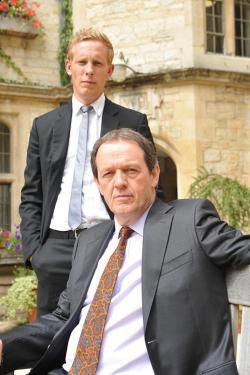With Inspector Lewis returning to PBS’s Masterpiece Mystery this Sunday, what better time to celebrate the art of the prestige-drama sidekick?
The need for an associate is at root a practical one—practical for the people who write TV shows, I mean. TV Detectives need someone to share their theories with so that we viewers can hear them out loud. Sure, Sherlock Holmes can get away with performing his process of elimination as a soliloquy, but only an oddball like him can get away with such flights of arrogance. Oddly enough, Masterpiece Mystery has more or less dispensed with helpmates for its superstar detectives, Miss Marple and Hercule Poirot. The various police inspectors leading the investigations essentially serve as Miss Marple’s assistants. In the early episodes of Poirot, the Belgian’s bumbling friend Capt. Hastings and his secretary Miss Lemon helped out, but they’ve been forgotten in recent seasons. And more’s the pity.
The best partners-in-crime-fighting are like those lockets that look jagged and misshapen when separated, but form a perfect circle when paired together. Most U.S. procedurals provide some kind of partner for the show’s chief investigator—to provide bro-tastic banter (Hawaii Five-0), to throw strange character traits into stark relief (Bones), or to bring out the mentoring instincts of an otherwise prickly character (Elementary, currently U.S. network television’s best platonic couple).
But the best ‘tec-team partnerships are on British mysteries.
Inspector Robbie Lewis has a special statue in the Sidekick Hall of Fame because he is perhaps the only sidekick to have graduated into the lead role with a sidekick of his own. In his years toiling alongside John Thaw’s Inspector Morse in the show of the same name, Lewis served as the long-suffering assistant to a brilliant but cold detective. Lewis was a working-class, Northern, family man who hadn’t gone to college; Morse was a single, opera-loving Oxford grad. Lewis learned a lot from Morse—not least of which was how to smile and nod when his own intelligence was insulted—which has perhaps helped him serve as a more collegial mentor for his detective sergeant, James Hathaway, another cerebral Oxbridge graduate whose head is full of facts and philosophy. They work well together—as Alan Cumming says in the prologue before Sunday’s premiere, theirs is “the only faithful relationship around”—and their affection for each other is genuine. They’re two lonely, sensitive men who are a little less lonely when they’re together.
Christopher Foyle (Michael Kitchen), of Foyle’s War, is my favorite PBS detective, and he has some excellent subordinates. There’s Paul Milner (Anthony Howell), a policeman who came home early from the war, having lost a leg while serving in Norway, and then there’s his faithful driver, the plucky Samantha Stewart (Honeysuckle Weeks). Milner and Sam are both wonderfully complex characters, but they’re so deep in the shadow of the honorable Foyle that they couldn’t hold the spotlight without him. It’s impossible to imagine a show called Inspector Milner or Driver Sam.
My pick for the perfect PBS sidekick goes to Det. Sgt. Barbara Havers (Sharon Small) in The Inspector Lynley Mysteries. This working-class copper, too quick to anger and too slow to absorb slights, must put up with an earl for a boss: At Scotland Yard they call him Thomas Lynley, but in Debrett’s he’s the 8th Earl of Asherton. I hate Lynley, and I was so-so on the mysteries, but I would take a bullet for Havers. Not only was she forced to play most of her scenes in a truly hideous car coat, she was incapable of hiding the pain she felt at the way the world had treated her, which broke my heart. Every time Lynley took credit for her hunches, I would have risked my own rank to defend her.
Lewis might have gotten his own spinoff, but Havers was the sergeant of the century.
